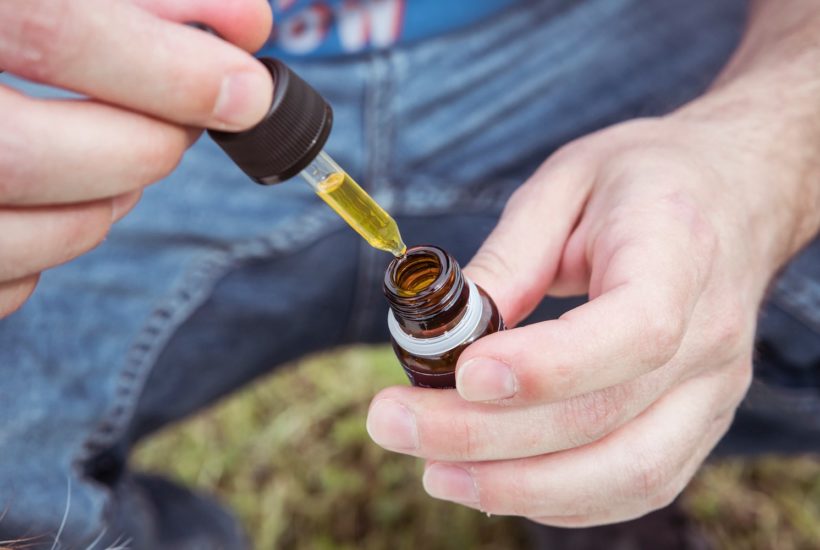Cannabis
How does COVID-19 affect CBD oil consumption
In difficult times like the current situation, people are trying to cope with their anxiety in different ways. CBD oil has been used as a natural way to relieve stress by several people. Some countries will continue to keep cannabis stores open despite the regional lockdown measures to maintain medical cannabis supply to patients and to avoid a surge in the black-market activity.

People are coping with the COVID-19 crisis and being quarantined in different ways. Some are binge-watching their favorite shows for the 30th time, some have started to actually cook the food in the refrigerators and learning new culinary skills, and some are transforming their bedrooms into a workspace.
However, some are also trying to incorporate CBD into their wellness routine in a bid to try and cope with the pandemic better. In times like this, people are looking for ways they can elevate their minds and alleviate stress, and CBD oil can help reduce anxiety. It has been used as a natural way to relieve stress by several people.
Stress ultimately impacts the immune system. To keep the virus at bay, one is expected to maintain basic hygiene and build their immune system. If we reduce fear-induced behavior, our bodies will resist and recover more efficiently.
However, a global recession could affect how the general public’s attitudes shift in response to the pandemic and also affect how the CBD industry fares during this virus outbreak.
How is COVID-19 impacting CBD consumption?
COVID-19 has taken center stage in international affairs over the past few months. It brought the consumption patterns in all industries to a rapid shift. Even so, most cannabis consumers in most countries intend to either maintain or increase their consumption for either health or mental reasons.
The most likely group to maintain their levels of consumption are medical cannabis users. Non-medical users are either expected to decrease or increase consumption because the lifestyle changes coronavirus is causing could lead to a drastic effect on non-medical cannabis consumption.
Consumer intent to the CBD market could cause a challenge in maintaining their supply lines over the next few months if the pandemic continues to cause turmoil in the world. We continue to be in short supply of medical resources, including medical professionals’ time and attention, because they are all directed towards containing and managing the disease outbreak.
With border restriction tightening by the day and logistics staff being unavailable, regions dependent on imports will face more challenges in supply in the coming months. Hence, regulators are now being forced to adopt new ways to make sure supply lines remain open to allow distributors to meet the demands.
The state of the world currently has prompted CBD and cannabis users to buy CBD and cannabis-derived products in bulk from dispensaries. This has to lead to record-breaking sales in the cannabis market, showing that there could be an increase in consumption in the coming months.
Some countries will continue to keep cannabis stores open despite the regional lockdown measures to maintain medical marijuana supply to patients. This is also to avoid a surge in the untaxed black-market activity.
However, to minimize in-person interactions, businesses that have remained functional have adopted innovative measures like accommodating telemedicine applications and offering takeaway and delivery services.
Even so, the CBD and cannabis-derived product market should still expect to lose some revenue due to factors like shop closures, disrupted supply chains, general economic slowdown, and restricted movement.
However, this could also prove a crucial time for innovation planning and strategizing for the cannabis market and bear fruits that will outlast the COVID-19 pandemic. For instance, over the past years, we have seen restaurant deliveries being normalized with the rise of companies such as Deliveroo and UberEats. Hence we could also see delivery services in the CBD market normalized if they prove cost-effective.
Dispensaries who adapt to delivery services could turn the most revenue during this pandemic and further lockdowns. However, companies in remote areas without access to delivery services could have a challenge in obtaining their products.
Innovative approaches put in place for distribution and consumption could prompt long-lasting changes in how CBD industries operate for better. However, the International Monetary Fund (IMF) is indicating that there could be a recession that makes things uncertain and what this could mean for the industry.
On the brighter side, research has shown that cannabis consumption could increase in times of economic downturn. Both social distancing and reduced employment could contribute to this increase. This data also corresponds to consumption trends prior to legalization.
With regions like the Netherlands, Illinois, and Quebec recognizing cannabis as an essential product for both medicine and recreation and not as an illicit substance, consumer bases could be further maintained or increased. Visit here to learn the benefits of CBD.
Generally, the COVID-19 pandemic has impacted all businesses across the globe, including CBD and Cannabis businesses. It might be a real challenge for a while, and it won’t be easy. There is a need for companies to consider innovative ways to keep their businesses afloat.
While most CBD shops have had to close their doors during this period to keep themselves and others safe, there is a silver lining in digital media efforts that will keep CBD and cannabis-derived products consumption afloat.
Rather than accept defeat, we recommend that CBD businesses use this situation as an opportunity to be creative and identify ways to service and stay connected with CBD consumers. This is the time for companies to bolster their online presence, which could allow businesses to experience an increase in online sales.
—
(Featured image by Enecta Cannabis extracts via Unsplash)
DISCLAIMER: This article was written by a third party contributor and does not reflect the opinion of Born2Invest, its management, staff or its associates. Please review our disclaimer for more information.
This article may include forward-looking statements. These forward-looking statements generally are identified by the words “believe,” “project,” “estimate,” “become,” “plan,” “will,” and similar expressions. These forward-looking statements involve known and unknown risks as well as uncertainties, including those discussed in the following cautionary statements and elsewhere in this article and on this site. Although the Company may believe that its expectations are based on reasonable assumptions, the actual results that the Company may achieve may differ materially from any forward-looking statements, which reflect the opinions of the management of the Company only as of the date hereof. Additionally, please make sure to read these important disclosures.

-

 Crowdfunding6 days ago
Crowdfunding6 days agoTasty Life Raises €700,000 to Expand Pedol Brand and Launch Food-Tech Innovation
-

 Biotech2 weeks ago
Biotech2 weeks agoDiscovery of ACBP Molecule Sheds Light on Fat-Burning Tissue Suppression and Metabolic Disease
-

 Cannabis2 days ago
Cannabis2 days agoCannabis Clubs Approved in Hesse as Youth Interest in Cannabis Declines
-

 Impact Investing1 week ago
Impact Investing1 week agoFrance’s Nuclear Waste Dilemma Threatens Energy Future
























